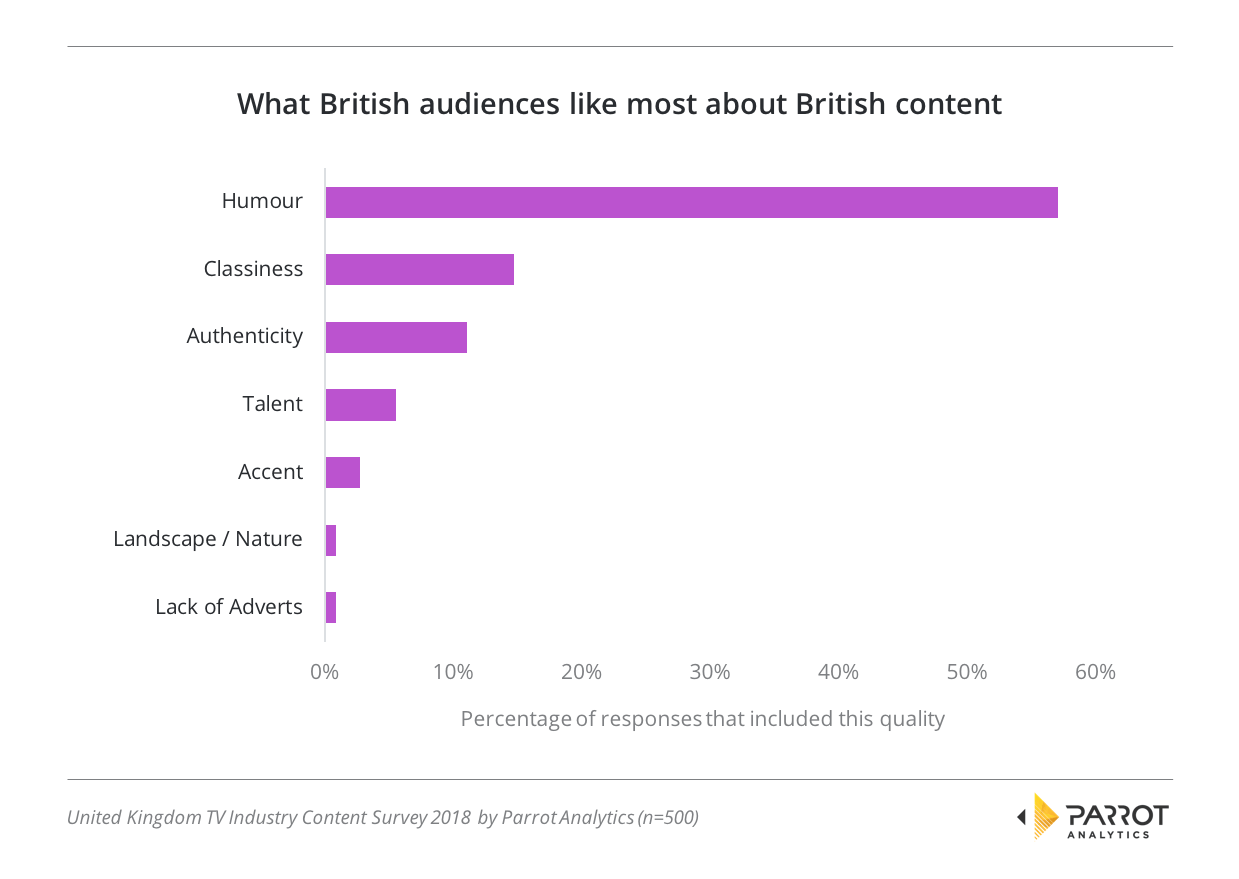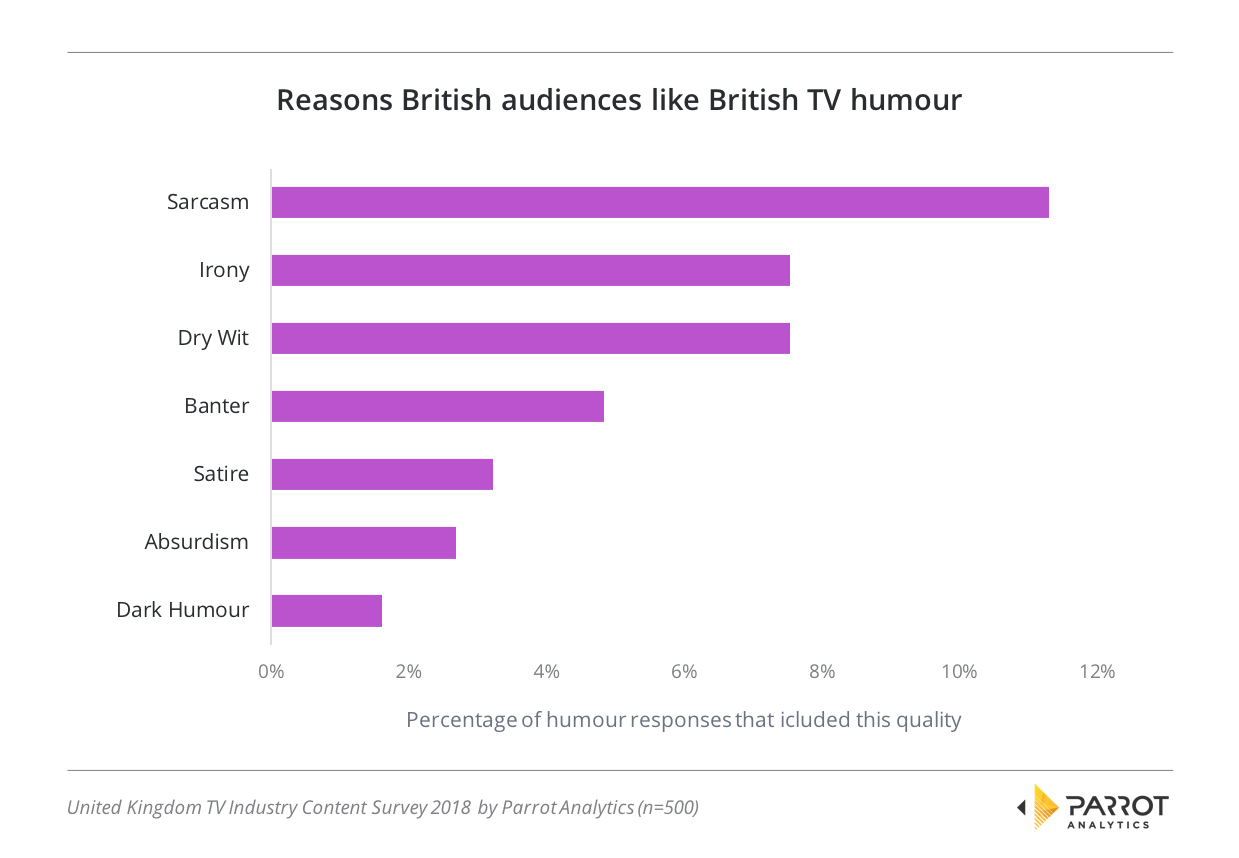Image: Doctor Who, BBC
The ongoing trend in the TV industry is the globalization of content. Thanks to the Internet and the rise of both local and global streaming platforms, it is easier than ever for viewers to consume content from all over the world. For local content producers in a particular market, this is both a threat and an opportunity.
While it is difficult for local TV to compete directly with the huge budgets and internationally recognized stars of the giant American media corporations, a production that is tailored to the local audience can resonate in ways that TV made elsewhere never can.
Additionally, there have been an increasing number of examples where a title that was made specifically to appeal in just one market nonetheless goes on to become a success in others.
In this study, Parrot Analytics has commissioned a survey to uncover just what it is that Brits really value about their local content. In doing so, we have identified many of the success factors that contribute to content emerging as a local hit. The survey involved participation from 500 Brits; the following question was asked:
QUESTION:“What qualities of British-made TV shows can’t be found in shows produced overseas (e.g. in the USA)?”
As this was an open-ended question with no fixed answers to choose between, survey participants could list as many qualities as they wanted. Some responses went into considerable detail about multiple aspects of British content, while others preferred to focus on the quality they considered most important.
In analyzing the responses, a set of overarching categories were identified; the content of each individual answer was then assigned to the category or categories on the basis of “best fit”.
What Brits like best about UK TV is the humour
The results of our survey revealed one particular factor very clearly: An overwhelming majority (57%) of respondents said that the humour was one of the qualities where British content was better than content from other countries.
Authenticity (11% of responses) and accents (3%) were also common qualities that appeared in the responses analyzed. Although this is less important to British audiences than it was to Australian audiences, viewers in the UK still prefer to watch titles that are relatable to their actual lives, whether that takes the form of hearing British accents or seeing characters making cups of tea.
The quality of British productions was mentioned in 6% of responses, with respondents praising both the on and off-screen talent behind UK TV. The biggest selection of these mentioned the quality of British actors, while a significant minority specifically singled out the British talent for costuming in period dramas.
1% of responses stated that their favourite thing about UK content was the lack of adverts, as the publicly-funded BBC does not show commercials during programs. The final category of response was the 1% that mentioned featuring the British landscape as one of the qualities where British TV is better than content from elsewhere.
What do the British mean when they refer to “humour”?
As humour was so overwhelmingly represented, we have separately investigated in more detail exactly what British audiences like about the humour featured in UK content.
Breaking down the humour responses by the exact types of humour mentioned shows that most respondents prefer sarcasm.
The survey reveals that British audiences really enjoy a well-timed put-down, as 11% of the responses that answered with “humour” as one of the qualities of British TV specifically said that sarcasm was part of that. Strongly related to sarcasm are ‘”dry humour” and “irony” which were both mentioned by 8% of respondents. The dryness and subtle irony of British humour is definitely something that British audiences miss when watching the “unsubtle” comedy of other countries: The differences between the UK and the US adaptation of The Office is probably the most well-known example of this. Combined, these three similar responses make up 26% of the humour category.
Outside of those three responses, 5% said British shows do “banter” best, this being the humorous back-and-forth between participants in a show exemplified by comedy panel shows like QI. “Satire”, in turn, was listed by 3% of humour answers, while 3% referred to “absurdism” as something British TV does better than anywhere else. Both forms have a long history in the UK: Absurd comedy TV shows have been a British television staple even before Monty Python’s Flying Circus introduced it to the wider world, while poking fun at authority is a comedy staple. Finally, 2% of people thought that “dark humour” was one of the qualities of British TV’s humour element.
Humour is a highly subjective concept and hard to get right, but doing it well is clearly very important to British audiences. International producers hoping to make a show that is a hit in Britain will have a better chance if they can successfully incorporate some dry humour, sarcasm and irony.
Which specific shows will British audiences praise unprompted?
While the question asked for what Brits like about British TV content generally, 8% of respondents used a specific show in their answer as an example of what they meant.
Most of these illustrative examples were making a point about relatability and so tended to use soap operas like Eastenders and Coronation Street that focus on everyday British life. However, slice-of-life comedies like The Office, Last Of The Summer Wine and The Inbetweeners were also used, as were UK-set dramas like The Bill and Doctor Who.
Considering the last example, the fact that for an alien who can go anywhere, anytime, The Doctor hangs around in the UK a lot is perhaps one of the ironies the British audience love so much.


